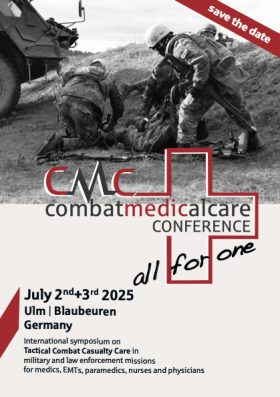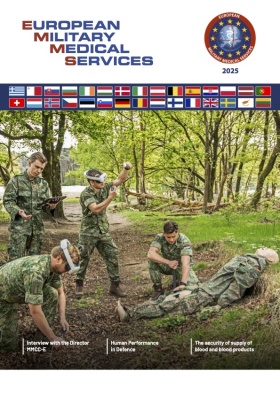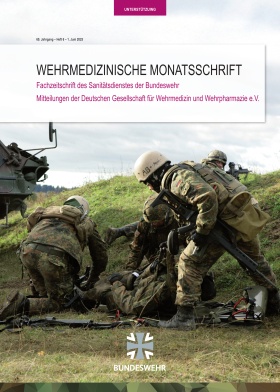
Article
The French Armed Forces Centre for Epidemiology and Public Health (CESPA) today and tomorrow
Jean-Marie Milleliri, Frank Peduzzi, Hélène Degui, Jean-Baptiste Meynard
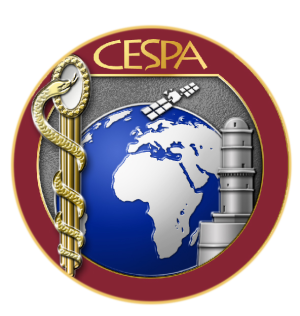
Created in 2011, the Centre d’épidémiologie et de santé publique des armées (CESPA) is at the heart of the support intervention for the French armed forces with its three pillars that make up its motto: observe, analyse, act. More than ten years after its creation, CESPA’s missions remain anchored in this triptych by identifying potential health risks in the armed forces, monitoring and analysing the health of the military community, developing health actions, recruiting and training technicians and specialists in epidemiology and public health, and fi nally, participating in the training of military health personnel.The CESPA is the result of a long tradition in favour of the collective improvement of the health of the forces that were entrusted in the past to the Armed Forces Medical Service (SSA). Heir to the Institut de médecine tropicale du Service de santé des armées (IMTSSA), commonly known as the Ecole du Pharo, an establishment founded in 1905 and disbanded in 2011, CESPA assumes this filiation. The various restructurings implemented by the Armed Forces Medical Corps have led to a rethinking of the deployment of epidemiology and public health capabilities and thus to the regrouping in Marseille of the two departments, North and South,dedicated to these functions for the support of the forces.
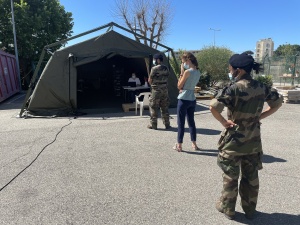
Public health activities: COVID-19 vaccination campaign within the French armed forces
Health surveillance and medical intelligence
CESPA applies the practice conceptualised in community medicine in the evolution of public health in the armed forces to force support. Defence health monitoring ensures the permanent collection of health information and its analysis to identify infectious and environmental risks that may have an impact on the armed forces. Health surveillance allows, thanks to the continuous monitoring of some sixty health events systematically declared by a vast network of practitioners in the armed forces and hospitals, the detection of situations requiring intervention and the rapid implementation of countermeasures, particularly epidemics. The expert missions cover two areas: participation in the development, implementation and evaluation of national health promotion and prevention plans, including vector risk prevention, for the benefit of the military and the implementation of research projects and studies of interest to the health of the military community.
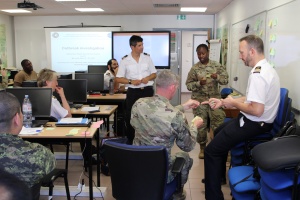
International cooperation: NATO MilMed CoE course in Marseille (France).
More recently, a military health observatory is being set up, for which CESPA will be responsible for producing and processing health data. Organised around several departments and with a staff of around one hundred civilian and military personnel, both permanent and reservists, CESPA carries out continuous missions based on monitoring and anticipation. In terms of monitoring, events and science,CESPA collects, analyses, assesses and disseminates health information in order to anticipate and prevent potential risks to the Force.This monitoring and anticipation capacity is evolving as the BEDOUIN database (Overseas and Intertropical Zone Epidemi ological Data Bank) will be supported by an artificial intelligence information processing system that will enable an initial analysis of the international health information collected. Combining a relevance and novelty score, this system will allow a faster analysis of a larger amount of information. Health surveillance is also at the heart of CESPA’s missions. By systematically and continuously collecting health events of interest, this surveillance makes it possible to identify situations requiring an investigation and/or an urgent reaction. In addition, the military population study teams, supported by data scientists and statisticians, describe and identify events that have an impact on the military population, which makes it possible to target research issues and fi nally to set up and evaluate public health programmes to reduce the impact of these events. This is the case for malaria, for example, which benefi ts from a real public health plan at the level of the armed forces. Using the OSEA© computerised system as a digital tool, this surveillance allows each health worker to report cases in real time, with CESPA collating, validating and analysing the data immediately. In the near future, a convergence between OSEA© and the AXONE© digital patient file will allow a direct extraction of information useful for the epidemiological analysis of the Force. This monitoring and surveillance can lead to action. CESPA is able to intervene and support the resolution of health crises thanks to its experts and specialists. This was the case, for example, during the Covid-19 epidemic on the aircraft carrier Charles de Gaulle. These Force Health Protection (PROSANFOR) measures are often aimed at preventing the transmission of pathogens, whether airborne, such as SARS-CoV-2, vector-borne, such as arboviruses or malaria, food-borne, environmental or other. Thus, in the face of an epidemic crisis, CESPA’s specialists constitute a strong and rapid response capacity, as was the case in January 2020 to control vector transmission and the Chikungunya epidemic within the French Forces in Djibouti. In order to share its expertise in the management of epidemic crises, CESPA, in collaboration with the DHSC – branch of the NATO MILMED COE, is organising a training course in its premises in Marseille, for the benefit of military doctors and other health professionals from NATO countries.
Two sessions are organised alternately:
• since 2014, Level 1- “NATO Health Surveillance and multinational
management of epidemic crisis for operational and strategic medical leaders
• and in 2023-Level 2 “NATO health investigation and management
in deployments” (HEIMDAL).
In addition, a simulation environment has been developed at CESPA with the objective of proposing epidemic management scenarios in the NATO context, of varying complexity depending on the level of the course and targeting epidemiological surveillance and health alert management practices. These courses aim to improve the analysis of the health situation of forces in the field, the detection of epidemics and the evaluation of the effectiveness of preventive measures. Led by its epidemiology specialists and accompanied by practitioners from various NATO member countries, this course thus participates in the international military public health training activities conductedby the DHSC to help strengthen the protection of NATO forces in external operations against the threats of infectious diseases and bioterrorist attacks. CESPA is the only SSA establishment qualified by NATO to organise and host such training on its premises.
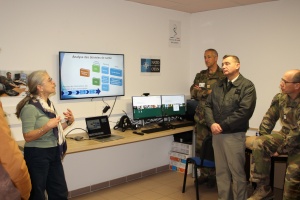
Expertise in health surveillance and medical intelligence: science in support of
military operations. (source for all images: CESPA)
Vector control and health promotion
In the continuity of these actions, the Vector Risk Prevention Department is implementing new intervention strategies. In the fight against malaria, the first steps have been taken with a decision to leave the reign of insecticide and to stop the re-impregnation of combat suits with permethrin. On the other hand, the use of tafenoquine in the Forces is being studied as a chemoprophylactic treatment for malaria. The prevention of health risks related to the military profession is a major issue for the armed forces. As such, in line with the defence health strategy (2019-2023) and since March 2017, CESPA has been working to develop health promotion in the armed forces. It acts on environmental, behavioural and social determinants outside the health care system (social support, housing, work, education, environment, political context, etc.). To this end, the Prevention-Promotion of Health (PPS) department of CESPA relies on a network of multidisciplinary and multi-level actors (strategic, operational and tactical) to promote health in the armed forces. The creation of a community of actors for health promotion in the armed forces (CAPSA) contributes to this objective.
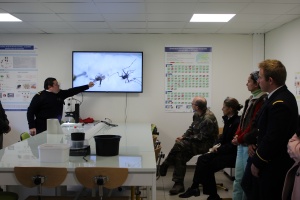
Pest and vector control: preventive medicine in action.
A brand new observatory for health of the militaries
Preserving the health and operational capability of military personnel is the main objective of the Armed Forces Health Service, which also requires knowledge of the health status of military personnel in order to develop appropriate health programmes. The CESPA implements punctual observational surveys through its Military Population Studies (EPM) service. In 2019, CESPA conducted the New Generation Survey (ENG) in collaboration with the National Military Social Security Fund. This survey was conducted among 5,000 military personnel from the armed forces, gendarmerie and SSA, and was used to describe the state of health of military personnel and their care and prevention practices. The future is now focused on the creation and monitoring of a general cohort (CoMitEx) for the period 2023-2025. This cohort should ensure prospective monitoring of military personnel, during their career and after they are discharged from the military, and of their exposome, an entity grouping together occupational exposures and exposures related to lifestyle habits. Thus, CESPA, a key player in data processing, should eventually, with its partners (Directorate of Forces Medicine, Directorate of Hospitals, Armed Forces Biomedical Research Institute (IRBA), National Institute of Health and Medical Research (INSERM), etc.), have a powerful tool to answer current and future questions on the impact of the military profession on health. To support all this data analysis work, and in view of the exponential growth in data, the complexity of processing, and the multidisciplinary nature of the knowledge to be mobilised, the strengthening of data scientist resources and their training will be the challenge for CESPA in the future. The use of new automation techniques in mathematical modelling and artificial intelligence combined with the use of simulation for operational preparation are promising ways to give more power to CESPA’s expertise. Proud of its origins and heir to these values in the service of mankind, CESPA, with its constant desire for excellence, is pursuing a rigorous path centred on its primary mission, to preserve the health of the men and women of the French Armed Force wherever they are and whatever they do.
Author: Médecin en chef (R) Jean-Marie Milleliri, Médecin chef des services
Frank Peduzzi, Pharmacien en chef Hélène Degui, Médecin général
Jean-Baptiste Meynard, Email: [email protected]
Date: 11/02/2023









